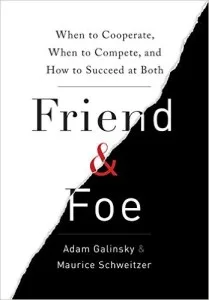Businesses usually adapt co-opetition as an interorganizational practice, learning to cooperate and compete with other firms at the same time. This principle — that a combination of cooperation and competition strengthens both parties and increases growth — is just as applicable at an organizational level.
 In a new book titled “Friend & Foe: When to Cooperate, When to Compete, and How to Succeed at Both” Adam Galinsky and Maurice Schweitzer explore the balance between cooperation and competition within the workplace. In a video interview with Wharton School of Business, they describe how a scarcity of resources causes big shifts in social dynamics, undermining cooperation. Galinsky uses the example of Thanksgiving to breakdown this friend-to-foe progression:
In a new book titled “Friend & Foe: When to Cooperate, When to Compete, and How to Succeed at Both” Adam Galinsky and Maurice Schweitzer explore the balance between cooperation and competition within the workplace. In a video interview with Wharton School of Business, they describe how a scarcity of resources causes big shifts in social dynamics, undermining cooperation. Galinsky uses the example of Thanksgiving to breakdown this friend-to-foe progression:
“Thanksgiving starts as the most cooperative day of the entire year. We come together as family and friends. We have an abundance of resources — all of this food — and then we switch, sometimes within an hour of the end of Thanksgiving dinner, into one of the most competitive moments of the year — Black Friday. What is scarce? These incredible deals: two TVs for $30.
What do people do? They literally trample each other to death to try to get one of these TVs. Whether it’s a good deal, whether it’s parental attention, whether it’s water, [the dynamic] changes quickly over time and fundamentally alters social relationships.”
These sudden shifts often emerges in work situations, where employees simultaneously work toward common goals while competing for promotions, raises and accolades. Sue Stockdale, an executive coach published in The Guardian, believes that to keep a balance between competition and collaboration in the workplace, people need to embrace a mindset of abundance. She says that without the perception of scarce resources, people are much more willing to “share information or to be open in their our approach.” Galinsky and Schweitzer’s research clearly agrees.
These two academics, however, also suggest introspection as an empowering way to find balance in the workplace. Galinsky reminds employees to ask themselves thoughtful questions: “Am I finding the right balance? Am I being exploited because I’m cooperating too much? Am I losing opportunities to make connections because I’m competing too much?” Checking in with your yourself one a month gives you the opportunity to course correct as needed to reap the benefits of co-opetition.
